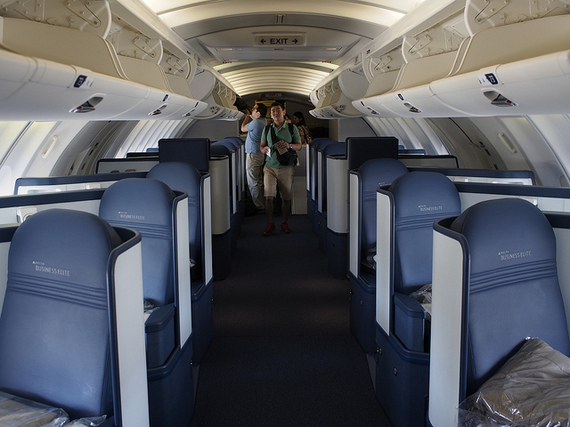Have you ever flown with a sinus infection or a toothache? If so, it's likely an experience you won't soon forget. Flying with various health issues can range from extremely painful to damaging, and their effects can cause major travel disruptions. According to Dr. Mark Gendreau, medical director of the emergency department at Lahey Medical Center, in-flight medical emergencies are on the rise, partly due to more and more people with medical conditions traveling by air.
Whether you're flying with a temporary sinus infection or suffer from restless legs syndrome, there are ways to reduce your in-air discomfort. A handful of doctors weigh in on some of the most common health issues travelers encounter when flying, plus helpful tips for coping with everything from insomnia to asthma at 35,000 feet in the air.
Sinuses and ears
Perhaps the most common health condition travelers experience when flying is sinus-related. According to Dr. Farhad Sigari, a board-certified otolaryngologist in Marina Del Rey, California, sinuses are impacted because of the quick change in pressure as the plane ascends or descends.
"Travelers with inflamed or blocked sinuses may experience significant pressure and even pain during changes in altitude," Sigari said. "Some patients may even experience a squeezing or hissing as the air inside the sinuses tries to normalize."
If you're experiencing mild sinus issues ahead of a flight, Sigari offered some specific preparation instructions: The morning of the flight, Sigari recommended pumping a nasal spray like Flonase in each nostril. Then, two hours before your flight, take one 12-hour Sudafed decongestant. When the flight begins pre-boarding (about 30 minutes prior to takeoff), spray Afrin two to three times in each nostril and keep it within reach in your carry-on. (Note that Afrin can only be taken for three days).
Dr. Jacob Freiman, a board-certified plastic and reconstructive surgeon in Miami, suggested sucking on candy and chewing gum to help equalize the pressure inside your sinus cavities to the pressure in the cabin.
For ear issues, Sigari recommended high altitude pressure-reducing ear plugs, but he advised postponing the flight if your sinus or ear infection is severe.
Teeth
According to South Florida Periodontist Dr. David Genet, the same cabin pressure that causes sinus issues can also affect your teeth. Untreated dental infections can lead to a gas buildup in your jawbone, he explained, causing intense pain and potentially spreading the infection. In the lower jaw, the pain can manifest as ear or jaw discomfort, while in the upper jaw, it can present as sinus pain.
In fact, Dr. Greg Cumberford, a dentist in Calgary, noted that the air pressure changes can even cause a tooth that has not been bothering you to suddenly become very painful, especially during takeoff and landing. Techniques like chewing gum or swallowing, which may help sinus irritation, don't eradicate tooth pain. In this case, pain relievers may be your only option.
"The best way to avoid this tooth pain is a dental checkup a few weeks before flying, to give yourself enough time to fix any dental problems," Cumberford said.
Restless legs syndrome
Characterized by an uncontrollable pulling and tugging in the legs, restless legs syndrome can worsen and intensify when individuals are inactive or confined to tight spaces, such as on a plane.
Dr. Richard K. Bogan, associate clinical professor at the Medical University of South Carolina, noted that symptoms are usually worse in the evening, so planning a short-duration flight during the day may be the best option. To manage RLS during the flight, he suggested massaging the legs, walking down the aisle, using cold compresses and engaging in mental activities, such as solving a difficult puzzle.
Insomnia
Insomnia patients have difficulty turning the brain off during normal sleep periods, which can be intensified by the stress of flying. "If travel is over several time zones, the internal brain and body clocks may be out of synchrony with the local time, thus aggravating the insomnia symptoms," Bogan explained.
To counteract the effects of flying with insomnia, he recommended going to sleep at your usual time, or if needed (and recommended by your physician), using a prescription sleep medication.
Bowel issues
Cabin pressure at cruising altitude can cause gases in the body to expand by as much as 30 percent, which can cause abdominal cramping and other medical concerns for people with bowel obstructions, diverticulitis or recent surgery, according to Gendreau. This can be especially troublesome if you're traveling shortly after abdominal surgery.
Gendreau suggested waiting at least two weeks after surgery before flying and noted that minor bowel issues, such as constipation or diarrhea, should not be problematic.
Asthma
Ever wondered why asthma symptoms can be triggered on a plane? According to Gendreau, the cabin is pressurized to 5,000 to 8,000 feet above sea level, which is equivalent to sitting on top of a mountain. This pressurization leads to decreased levels of oxygen saturation in passengers' blood, he explained. That, coupled with the low humidity aboard an aircraft, can dry out the bronchial passageways and incite an asthma attack.
As a rule of thumb, Gendreau said that to fly safely without the use of in-flight oxygen, you should be able to walk a distance of 150 feet and climb one flight of stairs without developing any chest pain or severe shortness of breath. If asthma is under control, Gendreau said it's safe to fly, though you should bring your inhalers and stay hydrated.
Whatever condition you may be traveling with, always check with your physician if there's any question about the safety of flying.
Lyn Mettler is an Indianapolis-based freelance travel writer who blogs at Go To Travel Gal. You can follow her on Twitter @GoToTravelGal or on Pinterest.
